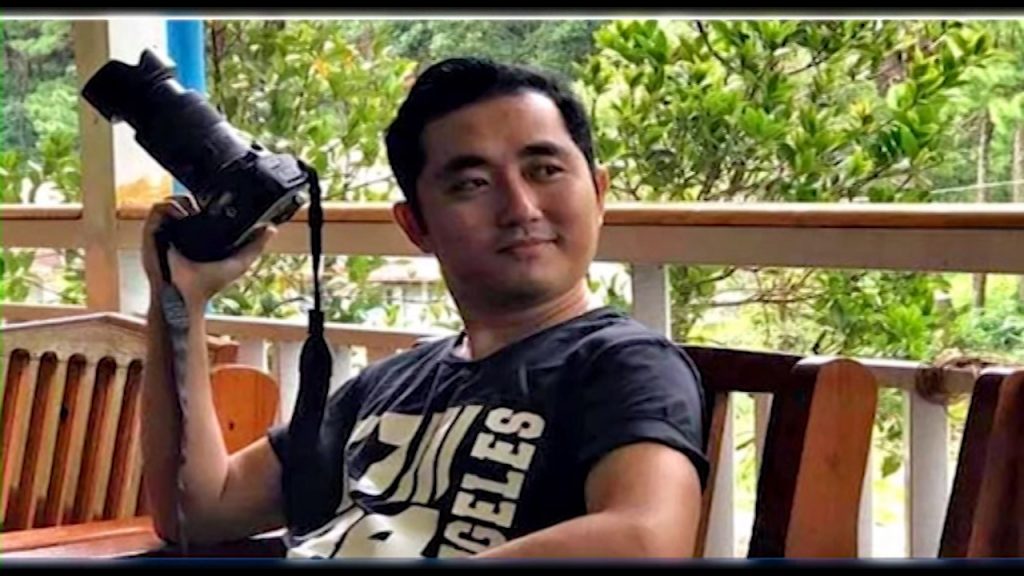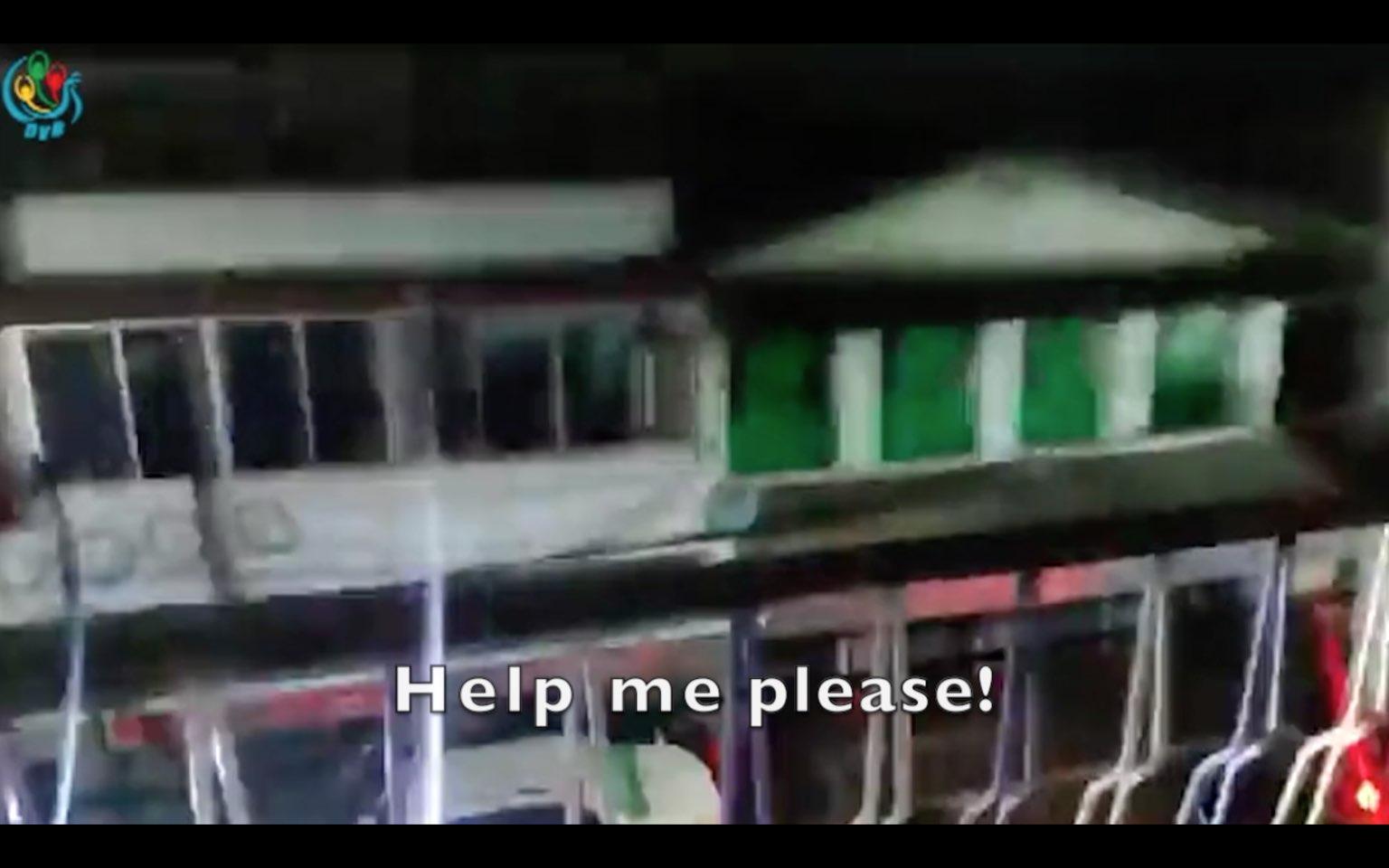DVB asks the international community to call for the release of all wrongfully detained journalists.
A man stands on the balcony of an apartment building in Myeik, southern Burma, pleading for help as the snap and ping of bullets ring around his home. ‘Bang pots and pans!’ he calls out to the neighbourhood, and to the tens of thousands tuning into Facebook shortly before the country’s nightly internet cut-off, ‘this is a terror attack!’ The man ducks inside to reassure his wife and daughter, then returns to taunt the soldiers at street level; ‘I said I’m coming in the morning. I’m not leaving’.
It is a scene that Burma’s Facebook users have become used to by 1 March. But the man live-streaming his abduction is not a politician or a civil servant. He is Aung Kyaw, a reporter with the Democratic Voice of Burma.
Three months later, Aung Kyaw is sentenced by a court in Myeik to two years in prison. His crime: ‘causing fear, spreading misinformation and inciting crimes against a government employee,’ or, simply, violating ‘the 505’, a section of Burma’s colonial era penal code rehashed two weeks after the coup, and an offence that everyone would soon hear of.
‘One of the world’s worst jailers of journalists’
Six and a half months of critically destabilising military rule has returned Burma’s news makers to the headlines. After a relative efflorescence of the country’s free press, the Tatmadaw, back in unreformed guise, has performed a violent, clinical purge of publishers critical of the new dictatorship.
From the live-streamed arrest of Aung Kyaw; to the horrific testimony of Kamayut Media’s Nathan Maung on the torture and sexual assault of colleague Han Thar Nyein in Insein prison; or the capture of Danny Fenster, Frontier Magazine’s American editor, as he awaited to board a flight to Jakarta at Yangon International Airport; the fact is that reporting from Burma is now a particular type of hell. No journalist is safe.
On 8 March, in the midst of intensifying urban protests, five independent media outlets had broadcasting licences revoked. Aside from DVB, Khit Thit Media, Mizzima, Myanmar Now, and 7Day instantaneously lost audiences, advertising revenues, and the ability to operate in the country. On 4 May, as the Tatmadaw’s aerial bombing campaigns gained in frequency, the military council banned two groups from Burma’s ethnic areas; Myitkyina-based The 74 Media and Shan State’s Tachileik News Agency.
In April, a military edict banned all satellite television services except that of state-run provider, Sky Net. In the major towns, troops went so far as to arrest those unfortunate enough to have competitor’s dishes affixed to their homes. For broadcasters like DVB— whose pirate station, initiated under military rule, had since developed into Burma’s largest independent television network—the banning of Thai provider, PSI, meant the instant scrapping of an advertising revenue based business model that had supported the group’s growth since 2012. Disregarding the bans, millions of viewers clandestinely retain their PSI dishes—some going as far as to camouflage them as Sky Net dishes—and DVB continues to broadcast TV news updates despite the odds.
‘We now operate in the same conditions as we did in 1992’
As highlighted in a recent CPJ report, Min Aung Hlaing’s junta has rapidly regained for Burma the distinction of being ‘one of the world’s worst jailers of journalists.’ After rising 20 places in their Press Freedom Index between 2013 and 2017, Reporters Without Borders’ (RSF) have said of the coup that Burma has been ‘set back ten years.’ In a country where due process has all but given way to the rule of brutality, the Burmese military have suspended sections of the 2017 ‘Law Protecting the Privacy and Security of Citizens’, removing the protection from arbitrary detention, and introducing to the country’s already magisterial penal code a host of new offenses, denying the right to speak critically of the coup and the military, or to support in any way Burma’s Civil Disobedience Movement.
Having covertly reported on human rights issues for thirty years, DVB is no stranger to these conditions. The expeditiousness of 2021’s crackdown did, however, surprise even the hardiest of Burma’s media professionals: nobody anticipated the haste in which violent new lows would be reached.

‘Independent media is dead’
By using section 505(A) as a sword, the junta has sent hundreds of journalists into hiding. In May and before the sentencing of Aung Kyaw and Zaw Zaw—a freelance reporter for Mizzima—in Myeik, another of DVB’s journalists, Min Nyo, was violently snatched and beaten by security forces whilst covering protests in Pyay. Without evidence, Min Nyo was charged with ‘inciting’ a fire department source to partake in Burma’s civil disobedience movement. After eight court hearings, he received a sentence of three years in prison.
Former DVB reporter, Thet Naing Win, suffered an almost identical fate after being arrested in Bago Region, charged under section 505(A), and sentenced to three years in prison. Reflecting the junta’s arbitrary cunning, reporter May Thwe Aung was arrested after being called to a police station to visit her detained husband, also a journalist. She was charged under penal code section 188—‘disobeying a public servant’—imprisoned for one month, and later released.
DVB has since been denied contact with its former reporters, and, in the words of founder and editor-in-chief U Aye Chan Naing, does not accept the verdicts of the military’s ‘kangaroo courts’.
‘Independent journalism is now dead in Burma’, says Aye Chan Naing, reflecting on the sudden turnaround of conditions. ‘It is almost impossible to speak freely without being detained’.
‘The situation is now almost identical to when DVB started, almost 30 years ago. We once again operate in 1992 conditions. Back then there was no freedom of speech, no independent reporting’. Drawing on their experience of these dark times, the organisation is readapting.
As with other media groups, DVB’s reporters have moved underground, aware that any public interactions are liable to result in their abduction by military forces. Many others have been exiled, or forced to cross into neighbouring countries where, even still, their freedom is not guaranteed. The organisation is currently aware of six staff who have been issued arrest warrants under Section 505(A).
Every other independent Burmese media organisation has staff—from founders to freelancers—who have been affected by the draconian law: amongst the highest profile are Mizzima founder, Daw Thin Thin Aung, and Kamayut Media co-founder, Han Thar Nyein; both of whom languish in prison awaiting their fate. The Assistance Association for Political Prisoners has published figures showing that, since 1 Feb, 98 journalists have been detained by the junta, with 46 yet to be released. This number ignores those working covertly as sources, stringers, or other functionaries in an industry which has quickly moved to operate in almost total secrecy. Many released political prisoners have spoken of the ferocious beatings journalists are subjected to whilst being held.
Burma’s national media is now represented by the state-owned MRTV network and junta mouthpieces, The Global New Light of Myanmar and Myawaddy—military institutions that had moderated since Burma’s opening up, but which now draw comparisons with Pyongyang in terms of the falsification of news and the dystopian exposition of totalitarian propaganda.
‘In 2007, the Saffron Revolution, when military forces shot a Japanese photographer [Kenji Nagai] dead in downtown Yangon, we had three concealed cameras trained on the victim,’ remembers another senior DVB employee. ‘Our cameramen scattered to safehouses where our grainy footage was upscaled, then compressed. The process took almost one whole day, but once we got it sent out of the country, the world saw what was happening in Burma and networks ran with the footage the world over.’
‘Luckily, technology has changed. Civilians now have digital cameras in their pockets. In 2021, everyone has a platform to show the world the true nature of the Burmese military.’
In early April the military junta itself admitted that, for all its draconian legislation and violent scare tactics, it had ‘not been able to control online and foreign media.’ Despite MRTV and Myawaddy forcing their monopoly over internal broadcasting rights, the two military channels have now been blocked across popular social media platforms such as YouTube and Facebook for spreading hate speech and fake news. As the coup ignites Burma’s citizens’ once-in-a-generation obsession with breaking news, this space has been filled by a surge in traffic to the accounts of independent media.
‘Our network and our expertise in putting out news across all media means that we are better placed than ever to carry on exposing the truth. It’s back to square one… but with far more experience and ammunition.’
DVB asks the international community to call for the release of all wrongfully detained journalists.
To support the work of DVB’s journalists, which is now more vital than ever, please consider donating here.



